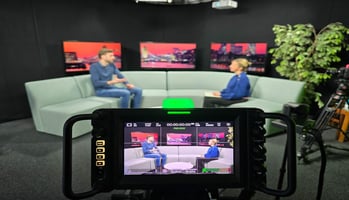‘Be as rude to me as possible’.
Have you ventured on Twitter since Elon Musk took it over?
If you have, you may have found yourself staring at an image of a roll containing massive slabs of cheese and huge onion slices.
And, if you haven’t, you may have seen the story in the papers or heard it on the radio as the tale of a pub’s fare went viral.
The Sugar Loaf, in Bristol, has found fame after an image of its £1.50 clingfilm-wrapped rolls, complete with a bottle of salad cream, was posted on social media.
The post from @panoparker, has attracted more than 34,000 likes and has been retweeted more than 2,500 times.
someone sent me this picture of cheese and onion sandwiches from their local pub pic.twitter.com/WSJ9OPLkBL
— James Parker (@panoparker) November 2, 2022
The same image shared on the @nocontextbrits account has had 6,800 likes.
And, as we stress during our social media training, what grabs attention online often captures the interests of journalists.
The generously-filled rolls have been covered by the BBC News website, ITV News West Country, Daily Star, and Bristol 24/7.
And there was a detailed report on BBC Radio Bristol’s breakfast show on Tuesday morning.
Landlord Martin Donlin told the journalist: “It’s astounding the response we’ve had.
“We’ve always done the rolls since I’ve been here, and the locals love them.”
A staff member added: “It is incredible to see how one photo shared across multiple platforms can have the traction it has had.
“It is a lovely reaction for the pub. It is a great pub to work in. And it is great to see the work Martin puts in being appreciated by all types of people.”
The BBC Radio Bristol slot also included a ‘masterclass’ on how to make the now famous rolls.
All priceless publicity for a pub at a time when many in the industry are struggling.
But why has the story grabbed attention?
To begin to answer that, we need to think about what makes something newsworthy.
We use the TRUTH model to explore this during our media training courses. It means you need something which contains:
Topical – Does your story relate to something people are currently talking about or want to hear about?
Relevant – Is the story relevant to the audience? What works for Daily Mail readers might not appeal to those who opt for The Guardian.
Unusual – Is there something out of the ordinary about the story? (More on this one below).
Trouble – Conflict is a crucial element of many stories and fascinates readers. But this can also be addressed by offering the solution to a problem.
Human interest – People love stories about people. Who are the people involved? What does it mean for others?
Now, this story ticks the ‘unusual’ box. Why? Well, you don’t see food like this in pubs anymore. I’m not sure I’ve ever seen rolls filled with such giant slabs of cheese.
People love stories about the unexpected. We want to hear about the biggest, the smallest, the first, and the last. And things that take us back – there is an air of nostalgia about the rolls.
If that doesn’t work for your organisation, don’t worry. The unusual element can also be something that offers a fresh perspective on a story or that moves the conversation forward.
The rolls story is also topical and relevant. At a time when money is tight, the cost-of-living crisis is gripping and many conversations include talking about how much everything now costs, here is a pub serving food for £1.50.
Where else can you get such generous portions for that sum?
And, in the subsequent interviews, it contained the human element. The landlord spoke about surviving cancer and recovering from a stroke.
Perhaps it doesn’t tick the trouble box – although doctors may argue that regular consumption might cause some health issues.
But on our media training courses, we would stress a story including four of these five elements is likely to be newsworthy.
The other aspect of this is it reminds us there is an appetite for stories that take us away from the doom and gloom that tends to dominate the news agenda.
With so much coverage about price rises, power blackouts, environmental catastrophe and events in Ukraine, people need an escape.
We want to hear about the inspirational, the positive, the heart-warming, the feel-good and the unexpected.
We saw this at the height of the pandemic. And it remains true today.
Of course, once you do grab attention, you need to make the most of the opportunity by having people who can help you tell the story.
I don’t know if Martin and his team have had media training.
But it seems they have embraced the media interest and have been happy to talk to journalists and move the story forward.
I loved that he told Bristol 24/7 website that grated cheese is “sacrilege”.
“I wouldn’t ever use grated cheese,” he said. “That is sacrilege.
“Cheese should be sliced. Grated cheese is a modern thing. The only thing to do with grated cheese is stick it on a pizza.
“Every day is different. And since I had my stroke, every roll is not the same. It’s always something with substance.”
Who knew that grated cheese was modern?
What I do know is these are the sort of quotes that helps bring stories to life and inject personality into them.
On another day, they could easily end up in the headline.
Always think about how you can move the story forward rather than repeating what others have already said.
On that note, I’m off to Bristol for a bap and a pint. And I’m packing the heartburn tablets.
Media First are media and communications training specialists with more than 35 years of experience. We have a team of trainers, each with decades of experience working as journalists, presenters, communications coaches and media trainers.
Click here to find out more about our media training.




